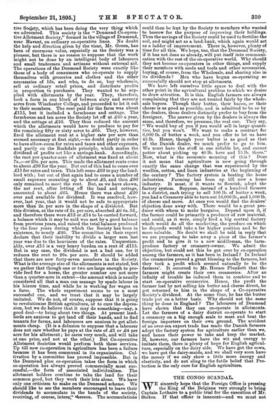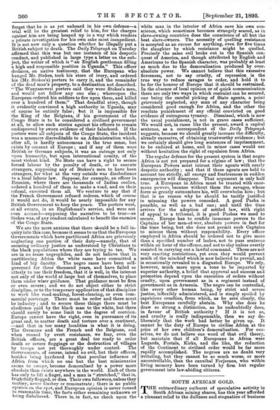THE CONGO SCANDAL.
AVE sincerely hope that the Foreign Office is pressing the King of the Belgians very strongly to bring Captain Lothaire to a public trial for the execution of Mr. Stokes. If that officer is innocent—and we must not forget that be is as yet unheard in his own defence—a trial will be the greatest relief to him, for the charges against him are being heaped up in a way which renders a private investigation for his own sake most inexpedient. It is not now only a question whether he illegally put a British subject to death. The Daily Telegraph on Tuesday affirmed that this was but one instance of his despotic conduct, and published in large type a letter on the sub- ject, the writer of which is "an English gentleman filling a high and responsible position in Uganda." This officer declares, on native testimony, that the European who hanged Mr. Stokes, took his store of ivory, and ordered his (Mr. Stokes's) porters to carry it, and the remainder of the dead man's property, to a destination not described. "The Wanyamwezi porters said they were Stokes's men, and would not follow any one else ; whereupon the European ordered his soldiers to fire upon them, and killed over a hundred of them." That dreadful story, though it evidently convinced a high authority in Uganda, may of course be entirely false ; but it is impossible for the King of the Belgians, if his government of the Congo State is to be considered a civilised government at all, to allow such stories against his officers to remain undisproved by sworn evidence of their falsehood. If the porters were all subjects of the Congo State, the incident was a massacre discreditable to an Administration which, after all, is hardly autonomous in the true sense, but exists by consent of Europe ; and if any of them were British or German subjects, it was an outrage not only upon humanity, but upon international comity, of the most violent kind. No State can have a right to secure forced labour by the penalty of death, or to execute strangers, supposing any of Stokes's men to have been strangers, for what at the very outside was disobedience to a local labour law. Suppose, for example, an officer in Reunion, where there are thousands of Indian coolies, ordered a hundred of them to make a road, and on their refusal, executed them all. We venture to say that if the French Government refused redress, which of course it would not do, it would be nearly impossible for any British Government to keep the peace. The porters were, at all events, in an Englishman's service, and were not even accused—supposing the narrative to be true—as Stokes was, of any conduct calculated to benefit the enemies of the Congo State.
We are the more anxious that there eisould be a full in- quiry into this case, because it seems to us that theEuropean Governments which have partitioned Africa are grievously neglecting one portion of their duty—namely, that of securing ordinary justice as understood by Christians to the black populations whom they are trying to tax. We are in no sense negrophiles, and do not believe that in partitioning Africa the white races have committed a kind of big dacoity. The negro races have been self- governed for three thousand years, and have failed so utterly to use their freedom, that it is well, in the interest not only of the world at large but of themselves, to place them under wiser guidance. That guidance must be firm or even severe ; and we do not object either to strict discipline, or to the temporary application of that discipline to work like road-making, forest-clearing, or even com- mercial porterage. There must be order and there must be industry ; and to secure these things there must be obedience paid by the black man to the white, but there should surely be some limit to the degree of coercion. Europe cannot have the right, even in pursuance of its great end, to scatter death and torture over a continent, —and that in too many localities is what it is doing. The Germans and the French and the Belgians, and when roused by overt resistance, we fear, even the British officers, are a great deal too ready to order death or severe floggings or the destruction of villages by troops not yet thoroughly under control. The Governments, of course, intend no evil, but their officers, besides being hardened by that peculiar influence of Africa from which no one but the best missionaries seems to escape, become demoralised by a power more absolute than exists anywhere in the world. Each of them has only to lift a finger, and a man is "stretched," that is, frightfully flogged, or dies. Their own followers, unless they mutiny, never disobey or remonstrate ; there is no public opinion on the spot, and European opinion is never roused in reasonable time, the facts either remaining unknown or being disbelieved. There is, in fact, no check upon the white man in the interior of Africa save his own con- science, which sometimes becomes strangely seared, as in slave-owning countries does the conscience of all but the best slave-owners. The necessity of quelling resistance is accepted as an excuse for anything, even for five times the slaughter by which resistance might be quelled. Precisely the same evil broke out in the Spanish con- quest of America, and though attributed by English and Americans to the Spanish character, was probably at least as much due to the demoralisation produced by over- absolute power. We cannot believe that this excessive fierceness, not to say cruelty, of repression is the true way to reduce savages to order, and hold it to be for the honour of Europe that it should be restrained. In the absence of local opinion or of quick communication there are only two ways in which restraint can be secured, one being the careful picking of State agents, a point grievously neglected, any man of any character being considered good enough for Africa, and the other the resolute punishment of any official convicted on good evidence of outrageous tyranny. Dismissal, which is now the usual punishment, is not in grave cases sufficient. We would not, in cases like the present, award a capital sentence, as a correspondent of the Daily Telegraph suggests, because we should greatly increase the difficulty, already excessive, of obtaining trustworthy evidence ; but we certainly should give long sentences of imprisonment, to be endured at home, and in minor cases would use without hesitation the right of expulsion from Africa.
The regular defence for the present system is that negro Africa is not yet prepared for a regime of law ; that the European Powers must intrust their agents with nearly despotic authority ; and that if these agents are held to account too strictly, all energy and fearlessness in sudden emergencies will disappear. That argument is only half true. A European in Africa must be trusted with enor- mous powers, because without them the savages, whose force so greatly outnumbers his, will overwhelm him ; but that is no reason why he should be tacitly justified in misusing the powers conceded. A good Pasha is possible, as well as a bad one; and until the time arrives for the adoption of settled law, with right of appeal to a tribunal, it is good Pashas we need to secure. Europe has to confide immense powers to the Captains of her men-of-war, absolute powers in fact for the time being, but she does not permit such Captains to misuse them without responsibility. Every officer employed in Africa should be ordered not to give more than a specified number of lashes, not to pass sentence within an hour of the offence, and not to slay unless overtly resisted in carrying out a lawful command. Those are not very exacting restrictions, yet even they would prevent much of the mischief which is now believed to prevail, and is occasionally revealed to a disgusted Europe. We rely, however, much more upon a tone to be imparted by superior authority, a belief that approval and success and promotion depend upon the execution of orders without cruelty, upon government as in a regiment instead of government as in Armenia. The negro can be controlled, like every other human being, by strict and severe justice, inflexibly administered, and is simply spoiled by capricious cruelties, from which, as he sees clearly, the best Europeans carefully abstain. Why else does he draw so strong a distinction, as he undoubtedly does, in favour of British authority ? If it is not so, and cruelty is really indispensable, then we say de- liberately that the work had better be given up. It cannot be the duty of Europe to civilise Africa at the price of her own children's demoralisation. For our- selves, we do not believe one word of that evil theory, but maintain that if all Europeans in Africa were Lugards, Portals, Kirks, and the like, the reduction of the Continent to civilised order would be far more rapidly accomplished. The negroes are no doubt very irritating, but they cannot be so much worse, or more uncontrollable, than the cannibal Feejeeans, who within living memory have been turned by firm but regular government into law-abiding citizens.



































 Previous page
Previous page